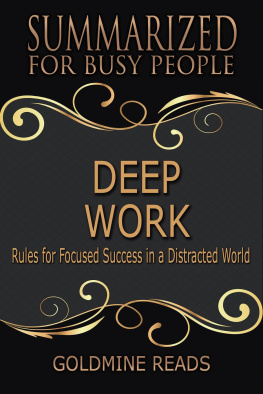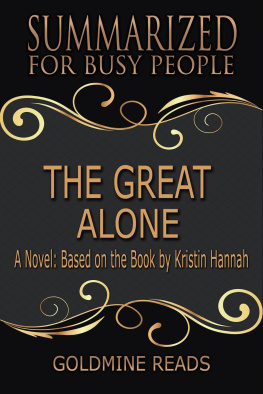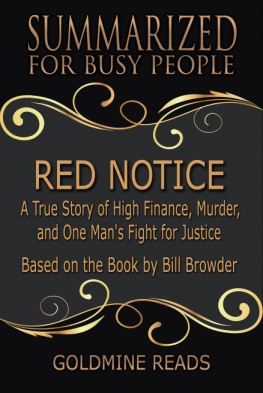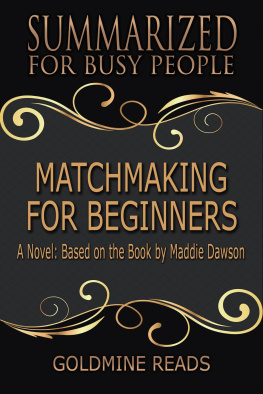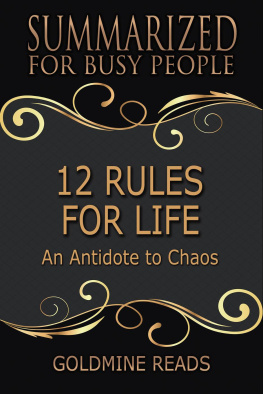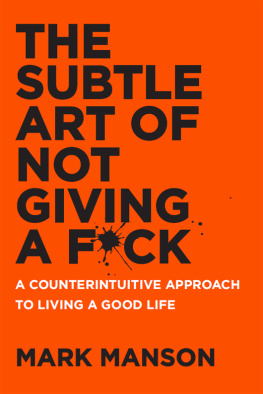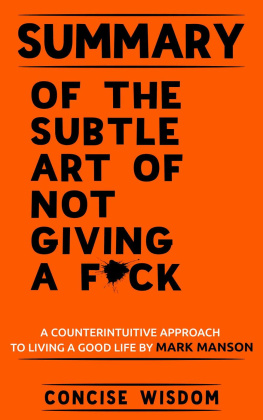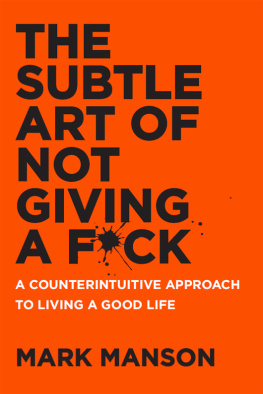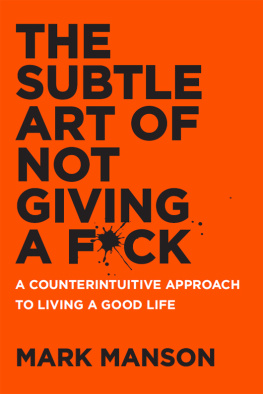THE SUBTLE ART OF NOT GIVING A F*CK
Summarized for Busy People
A Counterintuitive Approach to Living a Good Life
Based on the Book by Mark Manson
Goldmine Reads
Copyright Goldmine Reads
All Rights reserved. No part of this text may be reproduced, stored in a retrieval system, or transmitted, in any form or by any means, without the prior permission in writing of the copyright holder.
Under no circumstances will any legal responsibility or blame be held against the publisher for any reparation, damages, or monetary loss due to the information herein, either directly or indirectly.
Respective authors own all copyrights not held by the publisher.
TABLE OF CONTENT
M ark Manson describes a way for people to become enlightened by knowing what is important and making them your priorities, as well as resolving to not care about such trivial matters. Manson believes that there exists a psychological epidemic indicating that people concern themselves too much with lifes frivolities. According to him, these people have yet to accept the only certainties of lifefailure, suffering, and ultimately, death. Manson further argues that to be able to achieve a meaningful life, one first has to let go of whats out of control and hold oneself accountable for what is within control.
Mark Manson introduces us to a new perspective which places importance on suffering, pain, and lifes hardships. Manson also explains how fixating on only the positive aspects ultimately defeats its purpose. He also claims that living a life full of goodness and joy isnt necessarily ridding it of challenges and difficulties. Rather, it is learning to enjoy dealing with these challenges. Make a conscious decision of caring for, fighting for, and suffering for only the things that truly matter, and only then would you be able to make the most of your life.
A typical inspirational Hollywood film tells of the great American dreamliving a life in shambles, barely making enough money to get through, and slaving away until luck is struck. Before Charles Bukowski became a world-renowned author in his fifties and ultimately achieved this dream, he was a loafing drunkard who gambled away his money. Romanticization aside, Bukowski succeeded in life not because of his unwavering determination and fiery passion to write despite the countless rejections; his efforts paid off because he was aware of his shortcomings, and he accepted the fact that like all humans, he was doomed to fail. Charles Bukowski was sincere about admitting his faults, and even in his works, he disclosed his flaws in all honesty.
Todays culture sets unrealistic standards on just about every area of ones life, and accepting your failures just as Bukowski had done is considered a feat. It may be ironic, but obsessing about what society expects from you eventually becomes a harsh reminder that you still arent what they want to be.
The more, the better. People around you and the media run by people are compelling you to always do more, be more and have more. This insatiable desire for more was embedded into the core of our being. Is the unending quest for satisfaction really worth the toll it takes on ones mental health? Attaining a joyful and fulfilling life is based on your capacity to care less about trivialities and focus on what is immediate, significant, and real.
The Feedback Loop from Hell
A nxious about your pervasive anxieties? Angry about your bubbling anger? Perhaps you're stuck in a feedback loop from hell. Don't worry, though, for this behavior can be chalked up to our human nature. Our brain differs from all the rest of the animal kingdom because of our consciousness and our capacity to react to our thoughts. Society has imposed the idea that negative emotions like anxiety, guilt, and fear shouldn't be tolerated. Rather than simply dismissing them as part of a normal life, some people who do harbor these emotions resort to self-loathing.
Feeling bad about feeling bad won't be of any help in feeling better. Be at ease with your flaws and weaknesses, for this gives you control over the feedback loop from hell. The world is nowhere near perfect, so why should you be? It's okay to feel bad, but stop caring about it in ways that you begin loathing yourself for feeling that way.
With the rise of the world's wealth comes a shift in the crisis from a material one to a spiritual one. The fact that almost all people in a developed country can afford to live in abundance doesn't hide the rise of levels in anxiety, depression, stress, and other problems relating to mental health. Embracing your life's negative aspects is actually a positive and liberating experience because you eventually stop focusing on the things that you lack or can't do in life.
You can find happiness the moment you let go and stop trying to be happy; you can find life the moment you give up trying to find its meaning. As opposed to what society has been teaching us, seeing what's beyond one's possessions, looks, and dreams in no way diminishes one's ambition and indicates complacency. You can do better when you stop thinking of what would happen afterwards. Accepting the negative experiences life has taught you and embracing your flaws will help you lead a more fulfilling life.
Our time on Earth is limited, so it is of utmost importance to choose only which things to care about.
The art of not giving a fuck involves identifying which matter to you, making it your priority, and giving up your obsession about anything other than it. It is a task impossible to accomplish overnight, but becoming a master of this art may just prove to be worth it and more.
Concerning yourself about everything and everyone can be considered an illnessa fixation indicated by the urge to take everything under control. Such practice could bring pain and suffering in your life because you would consider adversities as injustices and you would take even minor troubles personally.



